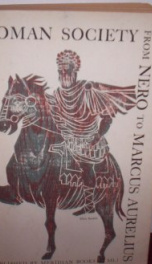roman society from nero to marcus aurelius

Purchase of this book includes free trial access to www.million-books.com where you can read more than a million books for free. This is an OCR edition with typos. Excerpt from book: CHAPTER III THE SOCIETY OF THE FSEEDMEN The historian, who is occupied with war and politics, and the fate of princes and nobles, is apt to lose sight of great silent movements in the dim masses of society. And, in the history of the early Empire, the deadly conflict between the Emperor and the Senate, the carnival of luxury, and the tragic close of so many reigns, have diverted attention from social changes of immense moment. Not the least important of these was the rise of the freedmen, in the face of the most violent prejudice, both popular and aristocratic. And literature has thrown its whole weight on the side of prejudice, and given full vent alike to the scorn of the noble, and to the hate and envy of the plebeian. The movement, indeed, was so swift and far spreading that old conservative instincts might well be alarmed. Everywhere in the inscriptions freedmen are seen rising to wealth and consequence throughout the provinces, as well as in Italy, and winning popularity and influence by profuse benefactions to colleges and municipalities. In almost every district of the Roman Empire the order of the Augustales, which was composed to a great extent of wealthy freedmen,1 has left its memorials. " Freedman's wealth " in Martial's day had become a proverb.2 Not only are they crowding all the meaner trades, from which Roman pride shrank contemptuously, but, by industry, shrewdness, and speculative daring, they are becoming great capitalists and landowners on a senatorial scale. The Trimalchio of Petronius, who has noteven seen some of his estates,1 if we allow for some artistic exaggeration, is undoubtedly the representative of a great class. In the reign of Nero, a debate arose in the Senate on the insolence and misconduct of freedmen.2 And it was argued by those opposed ...
Info about the book
Author:
Series:
Unknown
ASIN:
B002WTUUZC
Rating:
3/5 (4)Your rating:
0/5
Languge:
English
Users who have this book
Users who want this book
What readers are saying
What do you think? Write your own comment on this book!
write a commentGenre
if you like roman society from nero to marcus aurelius try:
Other books by this author
Do you want to exchange books? It’s EASY!
Get registered and find other users who want to give their favourite books to good hands!


